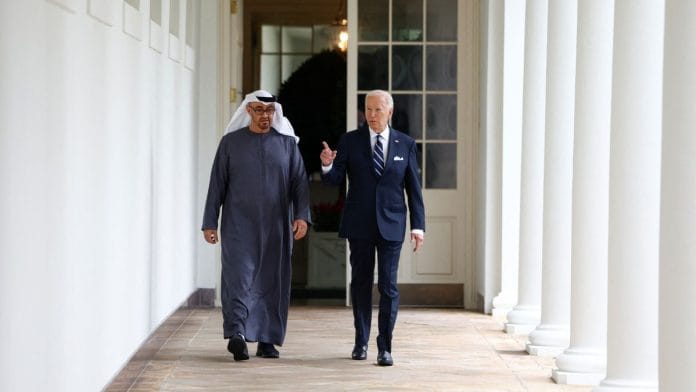New Delhi: The United States has designated the United Arab Emirates as a ‘major defence partner’ — a status so far enjoyed only by India — in a rare and significant move that could lead to increased trilateral cooperation, especially on military issues.
In 2016, then-US President Donald Trump named India a ‘major defence partner’ of the US.
US President Biden now announcing the designation for the UAE will allow for more cooperation through joint training, exercises, and military-to-military collaboration between the US, the UAE, and India. Additionally, many see the development as a step towards purchasing more sophisticated American weapons and technology for the other two countries.
The US made the new announcement during UAE President Sheikh Mohamed bin Zayed Al Nahyan’s (MBZ’s) historic visit to Washington — a first by a UAE President to the American capital in 52 years of bilateral relations.
“The UAE has become a strategic partner for the US and India in the last few years. This trilateral of sorts is now coming together at a time when the US and India are more strategically aligned to counter Chinese expansionism,” Indrani Bagchi, the CEO of Ananta Aspen Centre, told ThePrint.
“The UAE, aiming to be the premier power in the Gulf region, works on a principle of strategic autonomy, similar to India’s. With the agreement today, Abu Dhabi clearly is leaning more towards the US-India end of the scale. That is significant,” she added.
Also Read: US targets cheap products coming in from China. What’s the ‘de minimis’ loophole it’s trying to plug
An axis in the making?
The US, India, and the UAE are already closely engaged in the India-Middle East-Europe Economic Corridor (IMEC), apart from the I2U2 grouping, which includes Israel as the fourth partner.
But experts don’t yet see the countries as an “axis” in the making.
“Military exercises can be conducted without a deeper strategic or tactical meaning. They do not automatically translate to an axis. China, Iran, and Russia are seen as an axis but have had only one military exercise together, to date,” Kabir Taneja, a fellow with the Observer Research Foundation (ORF), told ThePrint.
The US, he said, is attempting to “remain a big player” while countries such as the UAE practise their strategic autonomy in foreign policy. New Delhi, meanwhile, “has bought into the story of the Arab world’s economic rise long-term”, he added.
Yusuf Unjhawala, an adjunct scholar at Takshashila Institution, argued that a shadow has now been cast over the existing avenues of engagement between India, the US, and the UAE.
“The Gaza war has negatively impacted I2U2 and the IMEC. The war has distracted Israel from multi-laterals like I2U2 and has posed logistical challenges for IMEC,” Unjhawala told ThePrint.
Also Read: Why India’s approval is key as Palestine tries to join BRICS
IMEC & expanding defence cooperation
During bilateral talks, US President Biden and MBZ discussed the progress on IMEC —kicked off at the G20 Summit in New Delhi last year.
“The leaders reaffirmed that the corridor… will generate economic growth, incentivise new investments, increase efficiencies and reduce costs, enhance economic unity, generate jobs… and enable the transformative integration of Asia, Europe, and the Middle East,” read the joint statement released after the meeting.
The joint statement named the UAE one of the most “capable” US military partners in the region after the two leaders agreed to explore investment in advanced defence systems.
The joint statement also mentioned maritime security, counter-piracy, counterterrorism cooperation, and domain awareness in the Middle East, the Indian Ocean, and East Africa as key areas for defence cooperation.
However, the US and UAE’s defence relationship has seen hiccups.
The US has been reluctant to sell F-35s to the UAE — which would have made the UAE only the second country in the Middle East after Israel to operate the sophisticated fighter jets.
In 2021, Trump signed off on the deal, but later, Abu Dhabi failed to agree to the terms laid out by the Biden administration.
This year, the UAE restricted US military strikes on Yemen and Iraq —conducted from Al Dhafra Air Base in Abu Dhabi. The US then had to move its military aircraft and drones to Qatar.
‘Peace and stability across the Middle East’
During talks in Washington, US President Biden and the UAE President discussed the war in Gaza amid fears of a spillover of the conflict into the region.
“The leaders discussed persisting and emerging threats to peace and stability in the Middle East and the wider region….They reiterated the importance of sustainable and enduring solutions to the security threats in the region, including those posed by non-state terrorist actors,” read the statement.
This week, Israel launched a major aerial offensive against Iran-backed Hezbollah in Lebanon following the pager blasts.
The US-UAE joint statement also referenced the “enduring importance” of the 2020 Abraham Accords, a normalisation treaty signed between Israel, the UAE, and Bahrain.
(Edited by Madhurita Goswami)
Also Read: MEA slams Iran’s Khamenei’s remarks on Indian Muslims’ ‘suffering’ as ‘misinformed’, ‘unacceptable’







Nice observations. It’s surprising that UAE would restrict US airstrikes in Yemen